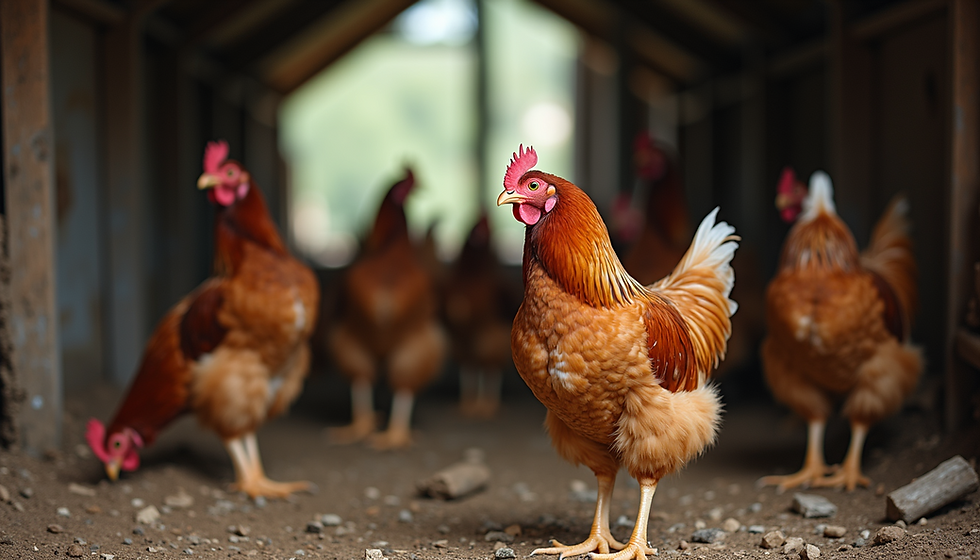Why Fresh Eggs Matter and Where to Buy Fresh Eggs
- Sep 23, 2025
- 4 min read
When I first started looking for fresh eggs, I quickly realized it was more than just a grocery run. It’s about connecting with the land, understanding where your food comes from, and savoring a taste that’s truly different. Fresh eggs from local farms carry a story of care, nature, and tradition. But how do you find them? And where to buy fresh eggs that are genuinely fresh and wholesome? Let’s explore this together.
Guide to Finding Fresh Farm Eggs & where to buy fresh eggs
Eggs are a staple in many kitchens, but not all eggs are created equal. The difference between store-bought eggs and those from a local farm can be striking. Fresh eggs often have richer yolks, firmer whites, and a flavor that’s hard to beat. But beyond taste, freshness means better nutrition and fewer additives.
If you’re wondering where to buy fresh eggs, the answer is often closer than you think. Local farmers markets, roadside stands, and small family farms are gold mines for fresh eggs. In Harlan, Kentucky, and nearby areas, you can find farms that prioritize animal welfare and sustainable practices. These places offer eggs that are not only fresh but also ethically produced.
Here are some tips to help you find fresh eggs near you:
Visit farmers markets: These are great spots to meet farmers and ask questions about their hens and egg collection.
Look for farm stands: Many farms sell eggs directly to consumers, often at better prices.
Check local online listings: Websites like Harlan Gossip provide community insights and can point you to trusted sources of fresh eggs.
Ask neighbors or community groups: Word of mouth is powerful in small communities.

How to Identify Truly Fresh Eggs
Not all eggs labeled “fresh” are the same. When you pick up eggs, here’s what to look for:
Shell appearance: Fresh eggs usually have a slightly rough, matte shell. Shiny shells might indicate older eggs.
Weight and feel: Fresh eggs feel heavier for their size because they contain more moisture.
The float test: Place the egg in a bowl of water. Fresh eggs sink and lay flat. Older eggs float because of air pockets inside.
Check the date: If buying from a store, look for the pack or sell-by date. But remember, farm eggs often don’t have these labels, so trust your senses and the source.
When you crack a fresh egg, the yolk should be round and firm, standing tall in the white. The white itself is thick and doesn’t spread too much. These signs tell you the egg is fresh and packed with flavor.
Are farm fresh eggs really better for you?
This question comes up often, and I’ve done my homework. The answer is yes, but let me explain why.
Farm fresh eggs tend to have higher levels of omega-3 fatty acids, vitamins A, D, and E, and antioxidants like lutein and zeaxanthin. These nutrients come from the hens’ natural diet, which often includes bugs, grass, and grains, unlike commercial feed.
Moreover, farm fresh eggs usually come from hens raised in better conditions. They roam freely, which reduces stress and improves the quality of the eggs. This natural lifestyle translates into eggs that are not only tastier but also healthier.
Scientific studies back this up, showing that eggs from pasture-raised hens have a better nutrient profile. So, when you choose farm fresh eggs, you’re investing in your health and supporting sustainable farming.

Tips for Storing and Using Fresh Eggs
Once you bring home your fresh eggs, proper storage is key to maintaining their quality.
Keep them cool: Store eggs in the refrigerator at about 40°F (4°C). This slows down aging and keeps them fresh longer.
Pointy end down: This helps keep the yolk centered and the egg fresher.
Don’t wash until use: Washing removes the natural protective coating on the shell, which helps keep bacteria out.
Use within 3-4 weeks: Fresh eggs can last a while, but the sooner you use them, the better the taste and texture.
When cooking, fresh eggs shine in simple dishes. Try them boiled, poached, or fried to taste the difference. Baking with fresh eggs also improves texture and flavor in cakes and pastries.
Supporting Local Farms and Building Community
Buying fresh eggs isn’t just about food. It’s about supporting local farmers who care deeply about their animals and the environment. It’s about keeping traditions alive and fostering a sense of community.
When you buy from local farms, you help sustain small businesses and encourage sustainable agriculture. You also get to know the people behind your food, which builds trust and connection.
If you want to explore options, check out farm fresh eggs from trusted local sources. They often share stories about their hens, farming practices, and seasonal availability. This transparency is refreshing in a world of mass production.

Embracing the Fresh Egg Experience
Finding and enjoying fresh eggs is a journey worth taking. It reconnects us with nature’s rhythms and the simple pleasures of good food. Whether you’re cracking eggs for breakfast or baking a family recipe, fresh eggs bring a richness that’s hard to match.
So next time you’re wondering where to buy fresh eggs, remember the value of local farms and the stories they carry. Your taste buds and your community will thank you.
Fresh eggs are more than just food - they are a celebration of life, care, and tradition. Why settle for less?




👍